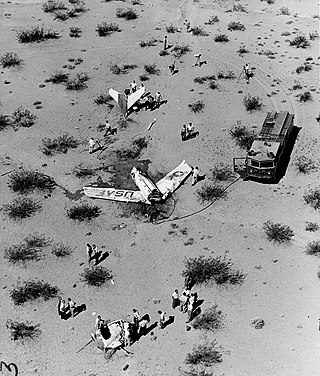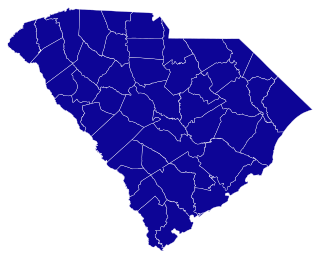
James Strom Thurmond Sr. was an American politician who represented South Carolina in the United States Senate from 1954 to 2003. Before his 47 years as a senator, he served as the 103rd governor of South Carolina from 1947 to 1951. Thurmond was a member of the Democratic Party until 1964, when he joined the Republican Party. He had earlier run for president in 1948 as the Dixiecrat candidate in opposition to Democrat Harry Truman, receiving over a million votes and winning four states, and endorsed Republican Dwight Eisenhower for president in the 1950s.
This is a list of aviation-related events from 1952:
This is a list of aviation-related events from 1955.
This is a list of aviation-related events from 1956.
This is a list of aviation-related events from 1962.
This is a list of aviation-related events from 1964.
This is a list of aviation-related events from 1966.
This is a list of aviation-related events from 1967.
This is a list of aviation-related events from 1973.
This is a list of aviation-related events from 1974. 1974 had been deemed as "the single worst year in airline history" although this has since been surpassed.

The Patrol Craft Fast (PCF), also known as Swift Boat, were all-aluminum, 50-foot (15 m) long, shallow-draft vessels operated by the United States Navy, initially to patrol the coastal areas and later for work in the interior waterways as part of the brown-water navy to interdict Vietcong movement of arms and munitions, transport South Vietnamese forces and insert SEAL teams for counterinsurgency (COIN) operations during the Vietnam War.

2-inch quadruplex videotape was the first practical and commercially successful analog recording video tape format. It was developed and released for the broadcast television industry in 1956 by Ampex, an American company based in Redwood City, California. The first videotape recorder using this format was built the same year. This format revolutionized broadcast television operations and television production, since the only recording medium available to the TV industry until then was motion picture film.

September 1956 was the ninth month of that leap year. The month which began on a Saturday and ended after 30 days on a Sunday

The 1956 South Carolina United States Senate special election was held on November 6, 1956, to select the U.S. Senator from the state of South Carolina simultaneously with the regular Senate election. The election resulted from the resignation of Senator Strom Thurmond on April 4, 1956, who was keeping a campaign pledge he had made in the 1954 election. Thurmond was unopposed in his bid to complete the remaining four years of the term. Thurmond would remain as Senator for nearly fifty years until he retired in 2003.
The following events occurred in October 1954:
February 1956 was the second month of that leap year. The month which began on a Wednesday and ended after 29 days on a Wednesday.
July 1956 was the seventh month of that leap year. The month which began on a Sunday and ended after 31 days on a Tuesday
August 1956 was the eighth month of that leap year. The month which began on a Wednesday and ended on a Friday after 31 days

On August 28, 1957, Strom Thurmond, then a Democratic United States senator from South Carolina, began a filibuster intended to prevent the passage of the Civil Rights Act of 1957. The filibuster—an extended speech designed to stall legislation—began at 8:54 p.m. and lasted until 9:12 p.m. the following day, a duration of 24 hours and 18 minutes. This made the filibuster the longest single-person filibuster in United States Senate history, a record that still stands as of 2025. The filibuster focused primarily on asserting that the bill in question, which provided for expanded federal protection of African American voting rights, was both unnecessary and unconstitutional, and Thurmond recited from documents including the election laws of each U.S. state, Supreme Court decisions, and George Washington's Farewell Address. Thurmond focused on a particular provision in the bill that dealt with certain court cases, but opposed the entirety of the bill.





